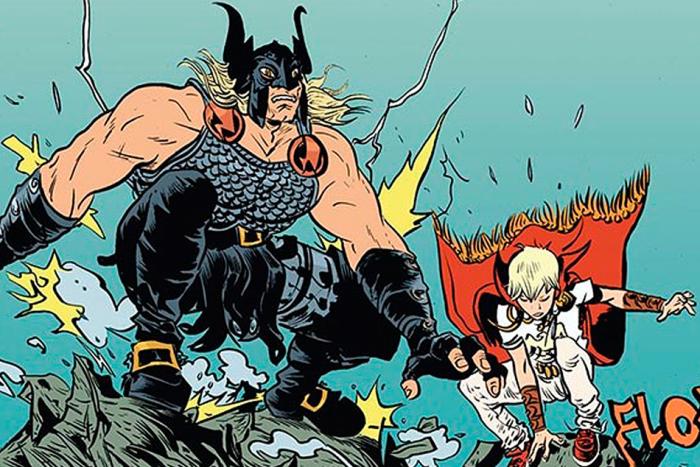The year I loved the Dismemberment Plan more than any other band in the world was also the most boring year of my life. Boring in a boring way, too, the way things are boring when you’re 15 and average and marooned in the world of your childhood. I worked an after-school job at a Catholic uniform store and came home by a bus route whose most interesting feature was a graveyard. I lived in Toronto, but I’d stopped smoking weed and without a fake ID I had nothing to do on weekends except ride the streetcar and chain smoke. Sometimes my best friend and I voyaged out into the suburbs, which were exotic to us—all the bands we liked came from the suburbs. One of the best nights of the year involved an acoustic concert at a Timothy’s in Whitby; the lead singer finger-banged me during an early-morning rerun of MacGyver.
Every morning I would curl up under the computer desk and listen to “The City” from the band’s 1999 album, Emergency & I (“Sometimes I stand on my roof at night/And watch as something seems to happen somewhere else”). In the fall, I went alone to see them play the Kathedral, a small venue where I stood front row, eye level to singer Travis Morrison’s crotch, and went through the chemical stages of love followed by a weeklong tour through the chemical stages of heartbreak. Several months later I saw them play the Reverb, the slightly larger venue upstairs, with Death Cab for Cutie; my standout memory is of avoiding a guy with a cold sore in the mosh pit, but it was a great show.
For me, the Dismemberment Plan came from an exciting place. This is strange to say, because Morrison’s stage persona, inasmuch as he had one, was what I’d call Yuppie on E at Karaoke (it was still “E” back in 2002). He wore slacks and tucked his shirt in and did the robot, and made it work through sheer commitment. His lyrics were clever and direct and concerned the minutiae of his day-to-day life. Take the first few lines from “Back and Forth,” Emergency & I’s closer: “There’s a kind of music that reminds me of you, it’s all clear expensive drinks and shiny shirts and the click of heels as they descend from the taxi like the first foot on the moon, oh, and it glows with ache—and if it hits me right it’s almost too much to take.”
This is a great lyric—clever and tight and emotionally lucid—and it does exactly what pop music is supposed to do, which is squeeze something romantic out of something banal. But with the Plan, the banal was always still banal; they stuck to their workaday leanings and never tried to mythologize them. For me, they didn’t have to. The life of a 9-to-5er was far enough removed from my little world that I could fantasize about temping, casual sex, dating people at a level of emotional remove, and buying my own bubbly on New Year’s Eve. At least it was something different. (By the standards of punk rock, the yuppie pride was exotic, too—the notion of “selling out” was still a thing then, so being “normal” was more punk than the opposite.)
The Plan were, and are, renowned for being dull. This week they released a new album, Uncanney Valley, their first in 12 years (they broke up in 2003, though they’ve played shows intermittently since 2007). They’ll be touring until the end of the year, on leave from their day jobs, which are not day jobs but in fact professions: Morrison is a web developer (who just launched a tech startup, Shoutabl); bassist Eric Axelson works in marketing for Capital One; guitarist Jason Caddell does sound for political events in DC; and drummer Joe Easley programs robots for NASA. “It’s becoming apparent,” wrote Devon Maloney in a Wired feature, “that diving full-force back into the normalcy that made fans fall in love with The Dismemberment Plan Is Terrified, Emergency & I, and Change to begin with—the real-life doubts and struggles of real-life people with real-life lives—is, ironically, what brought the Plan back to life.” (In the same article, Morrison notes, rightly, that the dream of not having a day job has been fairly demystified; there’s no reason you can’t work for money and be creative at the same time, and rarely a feasible way not to.)
The Dismemberment Plan is a great band. I’m so glad they’re making new stuff and selling out good-sized venues, and I’m so mad that Pitchfork gave their new album a 4.5 out of 10 after having ruined Travis Morrison’s solo career seemingly for kicks. This reviewer claims that “the time away has been tremendously unkind to Morrison’s wordplay” and pines for the “uncomfortable truths” he used to be “incredibly adept at revealing”: “that living around more people can make you feel more alone, that smarts don’t always equal satisfaction, that the party you wish they’d let you into is rarely the one you want to be at.” But these aren’t uncomfortable truths; they’re familiar truths, maybe a little too familiar now, and I think that’s why I don’t personally like the new album much.
Last year, Morrison’s wife, Katherine Goldstein, published an article on Slate about their relationship. The two met while working at the Huffington Post; she had little interest in music and no idea who he was, so when the band reunited for a spate of shows in 2011, she was surprised to find that the man who goes to bed at 10 p.m. and “loves to vacuum” could be the consummate showman. “I attended many of the U.S. shows, which brought many memorable ‘rock star’ experiences that were fun departures from our everyday life,” she wrote. “We had a blast ending up at the Pick Me Up Diner in Chicago at 2:30 in the morning to drink coffee milkshakes with a ragtag group of Travis’s old friends.”
I am old enough now, but still young enough to feel unsettled by anecdotes like this. It’s not that I want to be a functional alcoholic with badly dingered circadian rhythms at 40. It’s just that my life is quite dull, almost as dull as it was at 15, and the only difference is that I’m allowed to do things that make it seem more interesting—like drink, and stay up late, and listen to music made by people who’ve had different lives than me, because I’ve had this life for 27 years, and it’s deeply uninteresting, and it has produced a person who is thoroughly mediocre by my own standards and whom I’d rather not stare down sober in the mirror before 10 p.m. bedtime.
I hate how judgmental this sounds, because the point I’m trying to make is that no one has a monopoly on normal. My issue isn’t with 9-to-5 living, but with this notion that, to quote Maloney in Wired, “adulthood calls, and you move on.” Whose adulthood, exactly? What calls you forward is whatever seems worth striving for, be it financial stability or a life of intrigue—whatever sits at the right degree of difference from your life as it is now. So the Dismemberment Plan don’t do it for me anymore, but I still love them, for reasons captured nicely in the last verse of “Back and Forth”: “And sometimes that music drifts through my car on a spring night when anything is possible and I close my eyes and I nod my head and I wonder how you been and I count to a hundred and ten because you’ll always be my hero, even if I never see you again.” That’s a great feeling, and I hope it never goes away.





